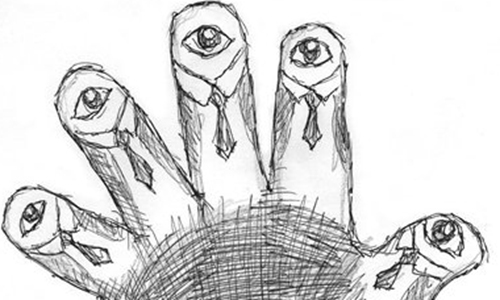India joining Five Eyes only wishful thinking
By Qian Feng Source:Global Times Published: 2020/7/5 21:08:40

Illustration: Peter C.Espina/GT
The Times of India recently published an article advising measures India should "quickly take to counter" the so-called Chinese challenge.In addition to the claim that "India has no choice but to expand and diversify the theatre of this conflict," the article also suggests that India should "join the Five Eyes network" since "a network of intel sharing on China is crucial now."
Recently, similar viewpoints have been common in Indian media reports and in the country's strategic circles. It reflects the sentiment of Indian hard-liners against China who want to contain the country by taking advantage of external forces. These individuals have grabbed the case of the latest border clash between Indian and Chinese troops to sensationalize their cause.
But it is unclear whether the Indian government will adopt their suggestions. Given Indian foreign policies of the past, especially those of Indian Prime Minister Narendra Modi, we can see New Delhi getting closer to Washington. But it has never completely tilted toward the latter. India has kept a strategic balance in terms of its relations with major powers such as China, the US, and Russia.
It won't be in the interest of India if it really joins the Five Eye intelligence alliance. New Delhi has been seeking to become a major world power. Playing the role of a little brother of the US within a certain alliance is not what India really wants. Therefore, this and similar proposals will find opposition by those in India who view joining the Five Eye alliance as a sacrifice of independence and autonomy.
Even if the US accepts India into such an anti-China alliance, it will not help India to protect its national interests because China will make corresponding policy adjustments.
Besides, India's current relationship with Russia is also relatively close. If India joins the Five Eyes alliance, it will be publicly indicating that China-India relations have become hostile. This will also be read as that the "special and privileged strategic partnership" between Russia and India has come to an end. This will be hard for the Modi administration to do, and it is not in line with India's national interests.
And even if the Indian government wants to join the alliance, it is very unlikely that the Five Eyes alliance will agree to accept India. The origin of the alliance can be traced back to the post-WWII period when the Allies issued the Atlantic Charter. The members of the Five Eyes alliance are strictly selected countries that share Anglo-Saxon heritage. To some extent, the closeness and traditional relationship of the Five Eyes alliance has exceeded that of NATO. Even Japan and South Korea, the US' core allies in Asia, are not qualified to join the alliance.
Indian people are neither offspring of the Anglo-Saxons, nor Americans' allies. They also did not establish close cooperation agreements with other countries in the alliance. From domestic perspectives in India and the US, their ties are actually a game in which the two countries make use of each other. In fact, the two countries have serious differences in trade and ideology, especially more and more criticism from Washington against Modi's religion policy, and are also wary of each other.
Such being the case, India cannot decide whether it can join the Five Eye alliance. The proposal is probably just wishful thinking by some Indian media outlets and political commentators.
The author is director of the research department at the National Strategy Institute at Tsinghua University in Beijing. opinion@globaltimes.com.cn
Posted in: VIEWPOINT